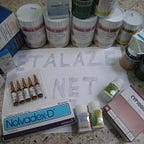The Science Behind Collagen Supplements for Anti-Aging
Collagen supplements have gained significant popularity in the anti-aging market due to their potential benefits for skin health and overall vitality.
Here’s a detailed exploration of the science behind collagen supplements and how they can contribute to anti-aging:
1. Understanding Collagen
- What is Collagen?
- Collagen is the most abundant protein in the human body, comprising about 30% of the body’s protein content.
- It is a primary component of connective tissues such as skin, tendons, ligaments, and bones.
- Types of Collagen
- There are at least 16 different types of collagen, but types I, II, and III are the most common in the body.
- Type I collagen is predominant in the skin, tendons, and bones.
- Type II collagen is found in cartilage.
- Type III collagen is present in the skin, muscles, and blood vessels.
2. The Role of Collagen in Aging
- Natural Decline with Age
- As we age, the body’s collagen production decreases, leading to signs of aging such as wrinkles, sagging skin, and weakened joints.
- By age 40, collagen production typically decreases by about 1% per year, accelerating the aging process.
- Visible Signs of Collagen Loss
- Fine lines and wrinkles
- Reduced skin elasticity and firmness
- Thinning hair and brittle nails
- Joint pain and stiffness
3. Collagen Supplements: Types and Sources
- Types of Collagen Supplements
- Hydrolyzed Collagen (Collagen Peptides): Collagen broken down into smaller peptides for better absorption.
- Gelatin: Partially hydrolyzed collagen that is less processed than collagen peptides.
- Undenatured Collagen: Native collagen that remains intact and is used in some specialized supplements.
- Sources of Collagen
- Bovine Collagen: Derived from cows, rich in type I and III collagen.
- Marine Collagen: Sourced from fish, primarily type I collagen.
- Porcine Collagen: Obtained from pigs, similar to bovine collagen.
- Chicken Collagen: Rich in type II collagen, beneficial for joint health.
4. Scientific Evidence Supporting Collagen Supplements
- Skin Health and Appearance
- Hydration and Elasticity: Studies have shown that collagen peptides can improve skin hydration and elasticity, reducing the appearance of wrinkles and fine lines.
- Collagen Density: Supplementation can increase collagen density in the skin, leading to firmer and smoother skin texture.
- Joint Health
- Arthritis and Joint Pain: Collagen supplements, particularly type II collagen, have been found to reduce symptoms of osteoarthritis and improve joint pain and mobility.
- Cartilage Repair: Collagen supports the repair and maintenance of cartilage, enhancing joint function.
- Hair and Nails
- Hair Growth: Some studies suggest that collagen supplementation can improve hair growth and strength.
- Nail Health: Collagen may also strengthen nails, reducing brittleness and promoting faster growth.
5. Mechanisms of Action
- Bioavailability and Absorption
- Hydrolyzed collagen peptides are easily absorbed into the bloodstream due to their smaller size.
- These peptides can then accumulate in the skin and stimulate the production of new collagen fibers.
- Stimulation of Collagen Synthesis
- Collagen peptides can promote the activity of fibroblasts, the cells responsible for producing collagen, elastin, and hyaluronic acid in the skin.
- This stimulation helps replenish the skin’s collagen matrix, improving its structure and appearance.
6. Practical Considerations
- Dosage and Administration
- Common dosages range from 2.5 to 15 grams per day, depending on the specific product and intended benefits.
- Collagen supplements are available in various forms, including powders, capsules, and liquid shots.
- Synergistic Ingredients
- Many collagen supplements are formulated with additional ingredients like vitamin C, hyaluronic acid, and biotin to enhance collagen synthesis and overall skin health.
- Dietary and Lifestyle Factors
- A balanced diet rich in nutrients that support collagen production, such as vitamin C, zinc, and amino acids, can complement the effects of collagen supplements.
- Avoiding excessive sun exposure, smoking, and high-sugar diets can also help maintain healthy collagen levels.
7. Conclusion
Collagen supplements have a strong scientific foundation supporting their role in anti-aging. By replenishing the body’s collagen levels, these supplements can improve skin hydration, elasticity, and overall appearance, while also supporting joint health and hair and nail strength. As with any supplement, it is essential to choose high-quality products and consult with a healthcare provider to ensure they meet individual health needs and goals.
